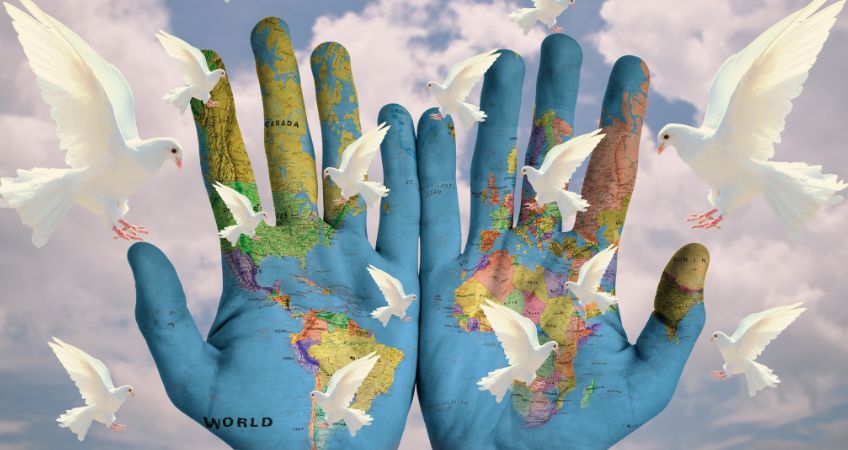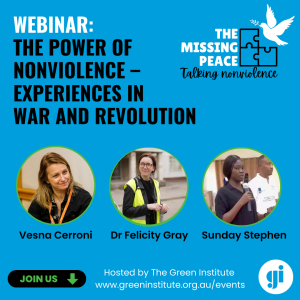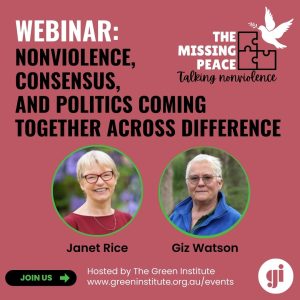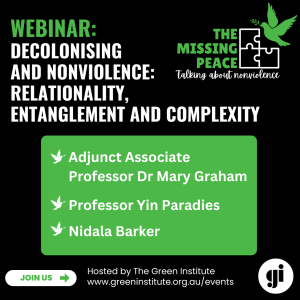The Missing Peace: Video And Next Events

In this unstable and volatile world, with most politics assuming that violence is the path to power and security, the Greens’ commitment to peace and nonviolence is a beacon of sense and compassion and wisdom.
And last Wednesday evening, we were treated to an immensely enriching and nourishing conversation between two great Greens elder states-people, Jo Vallentine and Bob Brown, leading us through what drove this commitment to peace, for them, and for the party and movement. The wisdom and depth of understanding they brought to the discussion was the perfect launch for The Missing Peace. I’m so grateful to them both for everything they bring to this work, and delighted that we now have this discussion on the record – for all of us who were there to listen back, for all of you who couldn’t make it to listen, and for posterity.
You can watch the conversation on our recordings page here, and on vimeo here, and you can listen to podcast audio here.
The conversation touched on so many aspects of the issue that we’re going to delve more deeply into in the months ahead, particularly as we develop the reading and discussion group program next year. And I’m excited that the next three webinar conversations are now ready for you to register and pop in your diaries.

The Power of Nonviolence: experiences in war and revolution, Sept 12, 8pm AEST
Can nonviolence really make change? Can it be a useful strategy in the face of war and oppression?
In this next webinar, we will be privileged to hear from three extraordinary women whose personal experiences in Serbia, South Sudan and Ukraine show us that, yes, nonviolence has extraordinary power – that it is a tool of the oppressed that has been long successfully used to fight extreme violence and oppression, respond to war, and take down dictators.
With so much conflict in the world, from actual war and genocide through to deep divisions that feel impossible to cross, it’s understandable that many people, even in our movement and party, are sceptical of nonviolence. But, as Judith Butler writes in their book, “The Power of Nonviolence”, nonviolence is “a practice of resistance that becomes possible, if not mandatory, precisely at the moment when doing violence seems most justified and obvious.”
It’s easy, when violence is so embedded in our systems, to believe Mao’s statement that “power comes from the barrel of a gun”. But, as Hannah Arendt wrote, “Out of the barrel of a gun grows the most effective command, resulting in the most instant and perfect obedience. What can never grow out of it is power. … Power springs up whenever people get together and act in concert.” Violence may be able to destroy. It can never create.
Arendt, like so many others, saw how the violence of the state, of the oppressor, can never be beaten by more violence. Nonviolence is the tool of the oppressed who seek to cultivate a better world. It is the tool that can make violent power crumble, offering people a path to defect, finding paths to build a future together.
Like millions of others, our three speakers have personal experience of this power.
Vesna Cerroni, now living in Australia as Canberra lobbyist for the Bob Brown Foundation, was engaged as a Spokesperson for Foreign Affairs of the Resistance with OTPOR, the nonviolent movement which helped bring down Slobodan Milosevic, transformed Serbian political culture and built on grassroots decentralised civil society. This enabled her to promote and work on conflict prevention, non-violent actions, peace building and reconciliation.
Dr Felicity Gray, well known to the Institute community as a former board director, former co-editor of Green Agenda, and a former staffer for Christine Milne and Richard Di Natale, is the Global Head of Policy & Advocacy for Nonviolent Peaceforce (NP). She is currently based in Washington DC, following working for NP in Ukraine (2022) and South Sudan (2020-21). Felicity holds a PhD from Australian National University, her research focusing on the uses of nonviolent action for the protection of civilians, and spanning field research across Myanmar, Lebanon, South Sudan, Europe, and the United States.
Sunday Stephen Nhial Thiang is a National Protection Officer with Nonviolent Peaceforce in South Sudan. Since 2018, she has designed and delivered unarmed civilian protection programs during the civil war and intercommunal violence in South Sudan. She is simultaneously completing her Bachelor of Development Studies at Starford International University Juba. As part of her job, she uses nonviolent strategies like protective presence and accompaniment to protect civilians at risk of violence.
I know you will learn a huge amount and be deeply inspired by this conversation! Register here.

Nonviolence, consensus, and politics across difference, Oct 2, 8pm AEST
Nonviolence is about a willingness to appreciate our coexistence, to respect our mutuality, our entanglement, and our differences, and to seek a path forward together.
In this way, a commitment to nonviolence is fundamentally intertwined with a commitment to consensus decision-making. And, indeed, strengthening our commitment to nonviolence goes hand in hand with strengthening our commitment to consensus.
It’s no coincidence that two of the Australian Greens’ best and most respected facilitators of consensus and difficult decision-making are also two of our staunchest activists for peace, and we are enormously privileged to have Janet Rice and Giz Watson join us for the third webinar in The Missing Peace series.
Together, we will explore how a shift in approach away from knee-jerk adversarialism and towards a willingness to come together across difference can transform politics from the hyper-local to the global, from communities and branches through to parliaments and geopolitics.
Register here for this crucial conversation.

Decolonising and nonviolence: relationality, entanglement and complexity, Nov 6, 8pm AEST
First Nations understandings of understandings of peace and security, violence and nonviolence, relationality and entanglement, have so much to teach us as we grapple with The Missing Peace.
The Green Institute is immensely privileged to bring you this conversation through which we will explore the complexity of decolonialism and nonviolence with three extraordinary Aboriginal thinkers, activists and writers: Adjunct Associate Professor Dr Mary Graham, Professor Yin Paradies, and Nidala Barker.
Nonviolence as an active practice of resistance to oppression emerged in no small part through decolonial struggles – most famously through Mahatma Gandhi’s leadership and philosophy of satyagraha. This is not to say that all decolonial struggles have been, or must be, nonviolent. Indeed, we are coming to learn more about Aboriginal resistance in the Frontier Wars. But it challenges recent claims that decolonisation is necessarily violent, and that nonviolence is a philosophy and practice born of privilege.
The fact that First Nations peoples lived on the land we now call Australia for countless millennia with no wars of aggression or territory, with no word in any of their languages for invasion or conquest, reveals how much we have to learn from Indigenous philosophies and practices of relationality and entanglement, with each other, and with country, with the land that is the law. Decolonial scholarship rejects the dichotomy between violence and nonviolence. Indigenous systems of governance institutionalise conflict in ways which acknowledge the reality of violence, but suppress its use. This is in some ways the opposite of the modern State, which institutionalises violence and has become ever worse at managing conflict.
We are privileged to have three tremendous First Nations guides to lead us through this conversation. Their bios are on the registration page.
Register here for this important and inspiring conversation.
I do want to remind you that, while you generous people paying for registration for these webinars is a sizable part of what enables the Green Institute to keep our work going on a shoestring budget, we always make bursaries available. If you want to come along but can’t afford it, or can afford to pay for one or two but not all of them, don’t hesitate to get in touch and ask for a bursary. We particularly want to offer these to students and First Nations people, but if you are keen and can’t cover the cost, get in touch.
And, for those who can pay it forward for others, that option is there, and I’m always blown away by how many of you are willing to do so.
I believe The Missing Peace is one of the most important pieces of work The Green Institute has engaged in for many years, and I’m delighted so many of you seem to agree. The registrations for last week’s webinar were through the roof, and the feedback has been tremendous and heart-warming.
Please keep the energy building. Share this blog to others in the party and movement and beyond who may be keen to join us. And join us for the next steps towards peace!
Yours in coexistence and entanglement,
Tim.
comments
Add comment